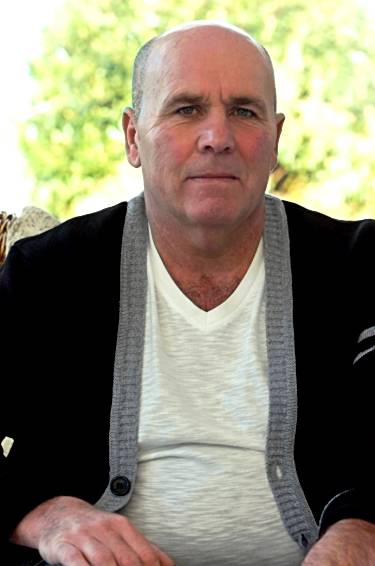Sportsman Ian refuses to be beaten
Date published: 09 February 2010

IAN TAYLOR: overcoming barriers
PARKINSON’S Disease can cause shaking, muscle stiffness and slow movement in sufferers making everyday life difficult.
We look at how former Latics goalkeeper and Oldham Rugby League FC stand-off Ian Taylor is using exercise to fight the disease after being diagnosed at only 48.
AS the first person to ever play professionally for both football and rugby clubs in his home town, Ian Taylor is used to overcoming barriers.
So when he was told, at the tragically young age of 48, that he had Parkinson’s Disease, the former sportsman vowed to fight back — by embarking on a punishing programme of exercise.
Now he does daily one-hour sessions on the cross-trainer, weights and treadmill, following by a relaxing swim and a pilates or yoga session at the Total Fitness gym in Whitefield, and he believes they have been a life-saver.
“I’m 100 per cent convinced that going to the gym has kept the disease at bay. Parkinson’s is a disease that affects muscles and if you don’t use them you lose them,” said Ian, who now lives in Radcliffe and has a daughter, Jennifer (29) and two grandchildren.
“The hospital advised me to do this and studies have shown the strong connection between exercise and warding off Parkinson’s. It has maintained my quality of life for longer.
“The pilates is amazing, too, for improving my balance, which really suffers when you’ve got Parkinson’s.”
The exercise programme has been devised by neuro-physio Catherine O’Neill, who Ian describes as “fantastic” and who helps him realign his body with massage when it drops to one side.
And while Ian, now 54, is battling at the gym to overcome the debilitating condition, his wife Jean is preparing for a challenge of her own to help her husband and other sufferers.
She is travelling to Spain in the summer to take part in a sponsored 50 kilometre group trek over three days in the Sierra Nevada mountains. She hopes to personally raise £2,000 and help her group surpass the total of £70,000 they raised on a previous trip.
Ian, who was also a swimming and sprint champion at Hathershaw School and who still holds the Oldham Schoolboys’ 100 yards sprint record — remembers the day they both heard about the diagnosis.
“It was a bolt from the blue and we just sat down and cried and cried — I thought my world had come to an end. It completely shattered me — no one in the family had ever had anything like that.
“I’d had a lot of head injuries during my career and been in the wars generally over the years, but no one can say if that caused it.
“Mind you, when I first saw the doctor at Beaumont Hospital in Bolton he said what I had could be one of three things — a brain tumour, a stroke or Parkinson’s, so it could have been worse.”
Ian, whose sporting career also included spells as coach at Rochdale Hornets and Oldham and winning a coveted scholarship to coach in Australia, first realised there was something wrong when he noticed his fingers going white and a tingling sensation in his hands while he was coaching rugby.
“Those are the first signs, although I didn’t know it at the time,” says Ian, whose dad, Jack, played rugby for Oldham before and after the Second World War.
At the time Ian was working as a rugby coach and a street warden for a housing association, but then his work started to suffer.
“I’d be out on the estate and I’d be tripping up and being really clumsy. And my left arm would go across my body and I wouldn’t be able to move it, and when I held a saucepan my hand would start shaking.”
Since then Ian has had to give up work completely, and now his days are spent at the gym, watching a bit of sport when he’s got the energy and trying to lead as normal a life as possible.
“But it is hard,” he said. “The drugs you take to combat the disease make you shake terribly — that’s called dyskinesia — which can be really embarrassing — and the other day in Bury I fell over.
“I tried to laugh it off by telling passers-by that I was only breakdancing, but it’s not funny really. Then again, I refuse to be a recluse.”
In his determination to beat Parkinson’s, Ian also volunteered to be the first person in the country to trial an experimental drug called Topiramate.
“It had been used to treat people with migraines and epilepsy and they discovered it also helped the symptoms of Parkinson’s.
“But when I went on it, it just didn’t suit me — I lost 10lb, it made me feel nervous and I became suicidal, so I came off it in November. But it was worth a try because I’m on my maximum limit for conventional drugs and we had to try something new.
“The next step now, probably in the next year or so, is to have deep brain stimulation, which involves fitting a cradle to my head and having rods put into my brain, which takes up to 16 hours in hospital. Then I have wires linked from the rods to a controller on my chest with which I can control the symptoms.
“They say that treatment can last 10 years, and after that there’s nothing more they can do, so they like to leave it as long as possible.”
In the meantime Ian is still going to the gym and fighting back in the only way he knows how, but it remains a struggle.
TO sponsor the Sierra Nevada Parkinson’s Disease Trek, contact Jean Taylor on 0787 061 8573.




